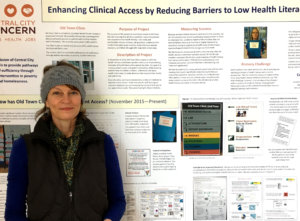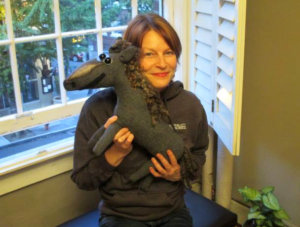This content block does not have a preview.
“We want to make this an environment that treats people who have had a lot of challenges in their lives with dignity and respect.”
— Anne Arthur
Health information is more important than ever — and it’s never been more confusing, as we all navigate the rapidly changing news about COVID-19. At Central City Concern, Anne Arthur is helping sort through the confusion so that clients can make informed decisions to keep themselves safe.
As a health literacy specialist, it’s her job to distill complex health information so that it is easy to access, understand and act on. “Working with medical information is always challenging,” said Anne. “You want to keep things clear, but not over-simplify to the point that you’re ignoring important details.”

At CCC’s Old Town Clinic, Anne Arthur and the rest of the staff are promoting health literacy every single day. In 2019, their work was spotlighted at the Oregon and SW Washington Health Literacy Conference, one of the largest health literacy conferences in the nation.
It’s a fine line, especially when it comes to COVID-19. For CCC’s clients — many of whom are dealing with the stress of losing jobs, managing chronic health conditions and living outside or in shelters — communication and guidelines must be as clear as possible. With a novel and frightening virus, clouded by controversy and unknowns, the need for clarity and consistency is even greater.
So Anne has been diligent about applying a literacy lens to everything from posters reminding clients to wear face masks to the guidelines around physical distancing.
She has found that a little bit of levity can help, too — that’s where silly photos of cats wearing face masks come into play. “Patients always appreciate humor, but even more so during these stressful times,” said Anne.

And because you can’t work all the time … Making Creatures like these is Anne’s favorite hobby. She has been sharing them with co-workers lately, to keep spirits up during the COVID-19 pandemic.
Anne started at CCC as a health educator, but quickly saw that she could make a big impact by focusing on the information and resources that were being shared with clients. Now, Anne spends the majority of her time working to keep CCC a “health literate” organization — that is, one that actively works to make it easier for people to navigate, understand and use information and services that support their health and wellbeing.
“We want to make this an environment that treats people who have had a lot of challenges in their lives with dignity and respect,” said Anne. And that includes empowering them to make informed decisions about their health, especially during times like these.
Did you know? You can be a health literacy champion, too! If you’re emailing family, posting on social media or making a poster for your own workplace, keep these tips from Anne in mind:
- Use plain, clear, direct language.
- Use large font.
- Use bullet points rather than long sentences or paragraphs. Keep each bullet point short and simple.
- Use visuals that reinforce your message without being distracting.
- Note: These tips aren’t just helpful for people with low literacy. They also help people with low vision, people who have cognitive disabilities, and people for whom English is not their first language — and any of us who are struggling to navigate confusing and ambiguous health information!